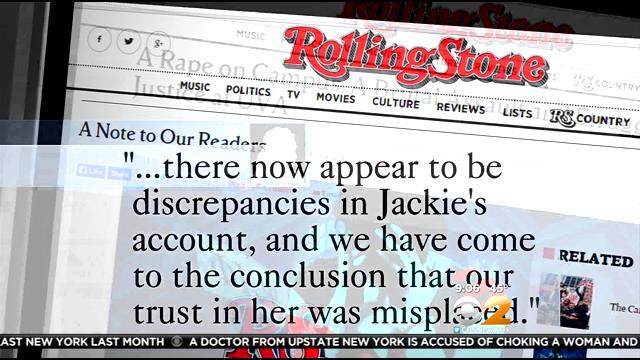
University of Virginia dean Nicole Eramo’s lawsuit against Rolling Stone has produced hundreds of pages of documents on how the botched article about University of Virginia came to be published—and how UVA employees handled sexual assault claims.

Last week, Rolling Stone filed affidavits and notes from the key people involved in the project. I’ve provided excerpts from the affidavits of reporter Sabrina Rubin Erdely, editor Sean Woods, and fact-checker Liz Garber-Paul. Robby Soave has an excellent article with five take-aways from the material; Ashe Schow offers commentary. I recommend both pieces. In addition, a few items:
Rolling Stone’s defense is based on two points, which appear in all three affidavits: (1) that everyone at the magazine believed the accuser, “Jackie,” and had reason to do so; and (2) key people involved in sexual assault adjudications at UVA believed Jackie as well.
There’s no doubt that Erdely, Woods, and Garber-Paul believed Jackie. There’s also no doubt that each of them were ideologically inclined to believe Jackie. (Erdely, for instance, opened her “reporting” by speaking with the biased experts Wendy Murphy and David Lisak, and all of her interview subjects appear to have been people who agreed with her on the existence of a campus “culture of rape.”) Rolling Stone’s groupthink meant that every inconsistency in Jackie’s story, or unusual behavior on her part, was explained away as “consistent with other victims of sexual assault.”
And so behavior that might have raised red flags—Jackie claiming that her attacker would retaliate against her if Erdely contacted him (while she didn’t worry about retaliation once the article appeared); Jackie discouraging Erdely from contacting friends who could corroborate her tale; Jackie changing the number of assaulters—was dismissed or excused.
The only problem, of course, is that Jackie was a fabulist. Rolling Stone’s argument that the behavior of an actual victim and the behavior of someone inventing a gang rape are identical should raise significant concerns about the always-believe-accusers mantra.
Second, the Rolling Stone affidavits make clear that campus activists, and every UVA employee dealing with sexual assault matters that Erdely encountered, also believed Jackie. Rolling Stone highlighted the point for legal reasons: if all of the UVA apparatus, including Eramo, believed Jackie, how can Eramo sue Rolling Stone for publishing an article based on Jackie’s fantasies?
From the standpoint of policy, however, this material is chilling: if the UVA sexual assault bureaucracy believed that someone like Jackie was a victim, how could the process of which they’re a part possibly be fair? Ironically, since Rolling Stone, UVA’s policy has only grown more unfair, as the recent FIRE lawsuit indicated.
In this respect, Erdely actually had a great story—how a campus atmosphere of moral panic was exploited by a fabulist. But she was too closed-minded to see it.
Third, it’s striking that even as their case collapsed, those who Jackie had fooled didn’t change their underlying assumptions. Erdely, for instance, stated in her affidavit that he she had any sense that Jackie might be lying, she simply would have used another vignette to prove her campus “rape culture” thesis—without even stopping to wonder whether her initial assumptions, which had led her to trust Jackie, were wrong. Sara Surface, a UVA activist, told Erdely that Jackie was no longer credible—but rationalized, “I think trauma has done something to the details.” A few days later, another UVA activist, Alex Pinkleton, reminded the Washington Post that “the majority of survivors who come forward are telling the truth.” Pinkleton didn’t explain how the minority—who, by her framing, were not telling the truth—could be “survivors.”
And, perhaps, my favorite item from the affidavits: Editor Sean Woods said, “I stand by the statement that we verified the perpetrator’s existence.” If the case goes to trial, perhaps Rolling Stone could summon Jackie’s invented attacker, “Haven Monahan,” as a witness?
Founding values were responsible over time for the rise of an American dynasty that has been—though not without its mistakes—a constant force for good in the world, extending the benefits of liberty and prosperity to the largest number of people at any time in human history. America was made great through its founding values and exercised its greatness more in its generosity than in conquest or imposition. But now America faces headwinds of ruthless partisanship, imperial over reach, and economic implosion.
Founding values were responsible over time for the rise of an American dynasty that has been—though not without its mistakes—a constant force for good in the world, extending the benefits of liberty and prosperity to the largest number of people at any time in human history. America was made great through its founding values and exercised its greatness more in its generosity than in conquest or imposition. But now America faces headwinds of ruthless partisanship, imperial over reach, and economic implosion.
i worked at rolling stone in the 80s….i find this whole episode (as a journalist) disappointing & shocking….what is missing from johnson’s column/post/remarks is that RS has – or had – a ‘fact checking’ process that, at least in my day, was fairly rigorous….it wasn’t ruthlessly distrusting or interrogatory but it wouldn’t let you get away with bold assertions without insisting you provide checkable documentation…saying you had a ‘confidential source’ didn’t cut it (back then)….i have no idea how or why standards changed…..but, again, i am as concerned about the abandonment of diligent fact checking as i am about the ideologies of crusading ‘journalists’….one can be a crusading journalists and write stories that are objectively accurate, you know….this goes beyond ‘worst case’ scenario in that ‘confirmation bias uber alles’ dominated editorial behavior(s)…it’s fact ‘checking’ – not fact ‘confirmation’